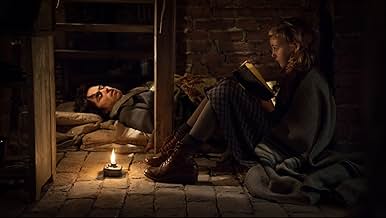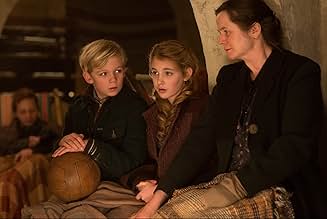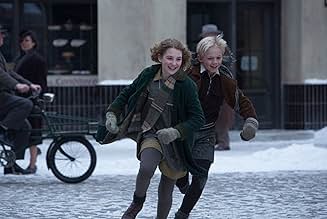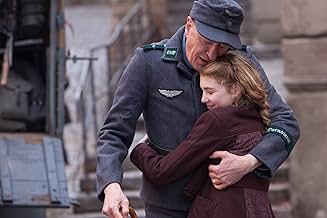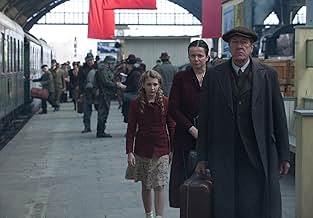Liesel assiste impotente agli orrori della seconda guerra mondiale e trova conforto nel rubare e condividere dei libri con gli altri, mentre i suoi genitori adottivi, offrono rifugio a un gi... Leggi tuttoLiesel assiste impotente agli orrori della seconda guerra mondiale e trova conforto nel rubare e condividere dei libri con gli altri, mentre i suoi genitori adottivi, offrono rifugio a un giovane ebreo nel seminterrato della loro casa.Liesel assiste impotente agli orrori della seconda guerra mondiale e trova conforto nel rubare e condividere dei libri con gli altri, mentre i suoi genitori adottivi, offrono rifugio a un giovane ebreo nel seminterrato della loro casa.
- Regia
- Sceneggiatura
- Star
- Candidato a 1 Oscar
- 9 vittorie e 17 candidature totali
- Narrator
- (voce)
- …
Recensioni in evidenza
Based on Markus Zusak's novel, The Book Thief expertly tells the story of a young German girl named Liesel, who is thrust into the horrors of World War II Germany and its many complications. The scope of the story is seen through the eyes of Liesel, making it quite an intimate tale that is less about war and more about the importance of remaining human in inhuman surroundings, and affecting those around you in a positive and profound way.
The film is hauntingly beautiful, and moves at an effortless pace- not too fast, not too slow- allowing the viewers to become immersed in the realities of Liesel's situation. Lovely Sophie Nelisse is stunningly perfect in the role of Liesel, capturing both the bright-eyed innocence and the eventual world-weary quality needed for the role. Liesel's good-natured friend Rudy is also expertly and realistically portrayed by young Nico Liersch. It is a delight to watch such wonderful young actors at work. Geoffrey Rush and Emily Watson, of course, are their usual extraordinary selves as Liesel's adoptive parents.
This is truly a movie that is not just for young people. It operates on many levels, as a commentary on the disastrous effects of World War II or a poignant tale of one small soul fighting for her own sense of humanity. While it might be a bit intense for small children, a film such as this should be mandatory viewing for older children and teenagers- a thoughtful and heart-tugging reminder of the fragility of life, and the importance of looking beyond yourself. It is the sort of film that will leave viewers young and old just a bit speechless.
This isn't the first film to adopt this perspective. "The Diary of Anne Frank" is the classic example, but more recently, "No Place on Earth" (2013) covered some of the same ground as did "The Boy in the Striped Pajamas" (2008) and especially "Lore" (2012).
"The Book Thief" has wonderful photography by Florian Ballhaus, an excellent musical score by Golden Globe and Oscar winning John Williams ("Schindler's List", "ET", "Star Wars"), and best of all, marvelous acting from Sophie Nelisse as the young girl, Geoffrey Rush and Emily Watson as her adoptive parents, and Ben Schnetzer as the Jewish boy they hide. Many of the core scenes with Nelisse, Watson, and Rush should be required viewing at any acting school.
Hats off too to young Nico Liersch who plays a boyhood friend of Nelisse.
If the film has any fault at all, it is the decision by the film makers to try to walk a fine line between drama and fable. Having "Death" as the narrator right from the start seems to suggest fable, but the story itself veers sharply to drama for most of the 2+ hours, and then, noticeably at the end, reverts to fable. Some viewers may find this disconcerting. But the power of the story and the acting generally compensate for this short coming.
I've read several 'professional' reviews for this work and it seems too easy for some Critics to sit in their comfortable cinema seats, or arm chairs in the safety of their homes, and write, what often amount to trite comments. They can read meaning (often their own) into works of crude ugliness, yet feel they have to hide from life affirming warmth.
From the very opening scenes this film draws you in. Some did not like the fact that death (as voice over) begins to tell the story, but this also served to make it all the more compelling. Screen play adapter: Michael Petroni who's been associated with such diverse works as "The Rite" and "Narnia" is equally at home writing for the BIG screen as well as TV. As is talented Director: Brian Percival (Downton Abbey & North and South) Both seem to have given their all, and with no less than 6 various producers, there seemed to be plenty of money to assure superb production values ~ guaranteeing a great look and feel. Director of Photography: German born Florian Ballhaus, captures the magnificence of the carefully selected locations, lifting astounding images from the pages of the book onto the screen.
The cast all work hard to bring to life the characters from Markus Zusak's novel. Child actors can sometimes be hit or miss but award winning Sophie Nelisse (Liesel) is reminiscent of the great Patricia Gozzi from the 60s (Sundays and Cybele '62 & Rapture '65) She convinces over a full range of emotions. Young Nico Liersch scores equally as Rudy.
Some cynical critics seem to have difficulty in understanding the intellect of children forced to grow up in terrible circumstances and may have been unnecessarily harsh. Rush is reliable as always, managing to convey the emotions of a man living with fear, yet playing it down for the sake of his young adopted charge.
John Williams' multi-layered music score brings to mind the style of strong scores that helped breath life into great classics from the past.
Films of this quality have become rare in these days of often foolish, Hollywood comic book action blockbusters, but it's hoped this, along with 'The Railway Man' might see us treated to more intelligent modern cinema. If I'd change anything, perhaps it could be the anticlimactic style of the closing scenes ~ looked as if more may have been added as afterthought, through one too many fade outs (a very minor point)
But more importantly, perhaps, some cynical critics may also be 'reminded of their humanity'.
There is an excellent blend of different pieces that move the film along well - the violence and the intensity of the time period, the touching relationships between friends and family, and the humor they all share. Though it's nothing new, the writing and lines are still great and make the characters very likable. Performances by the entire cast, no matter how small or large a role they play, are certainly deserving of praise. Even with all the dramatic events surrounding them, it is easy to get caught in the relationship between Geoffrey Rush and Emily Watson as the familiar nagging parents of Liesel.
The various sets of the film - backed up with some clean, beautiful cinematography (yet nothing too astounding) - show several different parts of the town, but you are still left wanting to see more of this world. Which is where the film falls in general. For the majority of the movie, you are invested into these characters and you follow their time through WWII, and much goes on. The ending, however, comes rather quickly and you are left with that same feeling of wanting to know more. Not just of the ending, but everything before. It seems every time a moment - of suspense, of sadness, or happiness - comes, it holds on for a short while, but cuts off before you can fully take it in.
Still, the film gives a touching story to watch. The subject matter is obviously very serious, but the story of "The Book Thief" allows a wide range of people to watch this and understand, be it a young child or an adult. The characters are the best part of this film and I found them very enjoyable. The film is rather traditional and almost doesn't fit in with the rest of today's movies, but rather reminded me of many other older classics.
Lo sapevi?
- QuizOne of the books that Liesel read to Max when he was sick is actually the novel "The Book Thief", namely the sentence: "what came to her then was the dustiness of the floor, the feeling that her clothes were more next to her than on her, and the sudden realization that this would all be for nothing".
- BlooperWhile in the basement, Hans comments that the snowman will not melt because "it's freezing down here," yet no character's breath can be seen in the air, despite the fact that all are breathing heavily. The visibility of breath in the cold is determined by not only the temperature, but also the relative humidity, so it is possible for it to be cold without the characters' breath showing.
- Citazioni
[from trailer]
Max Vandenburg: If your eyes could speak, what would they say?
- ConnessioniFeatured in Today: Episodio datato 23 agosto 2013 (2013)
- Colonne sonoreWiegenlied (Lullaby) Op. 49 No. 4
Written by Johannes Brahms
I più visti
Dettagli
- Data di uscita
- Paesi di origine
- Siti ufficiali
- Lingue
- Celebre anche come
- Ladrona de libros
- Luoghi delle riprese
- Aziende produttrici
- Vedi altri crediti dell’azienda su IMDbPro
Botteghino
- Budget
- 19.000.000 USD (previsto)
- Lordo Stati Uniti e Canada
- 21.488.481 USD
- Fine settimana di apertura Stati Uniti e Canada
- 105.005 USD
- 10 nov 2013
- Lordo in tutto il mondo
- 76.586.316 USD
- Tempo di esecuzione
- 2h 11min(131 min)
- Colore
- Mix di suoni
- Proporzioni
- 2.35 : 1







